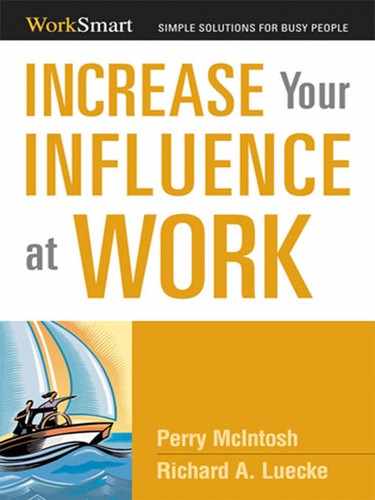88 Increase Your Influence at Work
MEANS
Even when our ends are ethical, there are plenty of temptations to
achieve them through unethical means: by cutting corners with the
truth, by concealing and manipulating, by employing ‘‘the stick’’
when the carrot fails. Niccolo
`
Machiavelli, author of the sixteenth-
century treatise The Prince, stated what he saw as an irony: that
good ends must often be achieved through evil deeds. In his view,
ends justify the means:
Anyone who would act up to a perfect standard of goodness
in everything must be ruined among so many who are not
good. It is essential therefore for a prince to have learnt
how to be other than good and to use, or not to use, his
goodness as necessity requires.
1
(Our italics for emphasis.)
Machiavelli’s statement, of course, has associated his name ever
since with an unflattering character ‘‘type.’’ A Machiavellian person
is one who will stoop to any means, including deception, violence,
and manipulation, to achieve his ends. This is not something you
should aspire to in your campaign to have greater workplace influ-
ence. Applying influence in unethical ways may bring success in the
short term, but it will hurt you in the end. Consider the following
ethical and unethical means:
....................................
ETHICAL MEANS (HONEST UNETHICAL MEANS (LYING OR
DEALINGS) MISREPRESENTING FACTS)
? Disclosing one’s agenda or ? Concealing or
interests misrepresenting one’s
agenda or interests
American Management Association
www.amanet.org

The Ethi cs of Influe nce 89
? Delivering information ? Delivering information
that reflects both sides of that supports one’s
an issue interest while withholding
unfavorable information
? Ensuring transparency ? Manipulating and
dissembling
? Promising only what one ? Promising more than what
can deliver one can deliver
....................................
Consider this example of ethical means at work:
Janet works as a representative for a major stockbrokerage
firm. The company’s analysts have just issued a report and
‘‘buy’’ recommendation on XYZ Technology. Believing that her
client, Mrs. Jones, would benefit by owning XYZ shares, Janet
gives her a call.
‘‘Hello, Mrs. Jones. This is Janet calling. I wanted you to
know about our company’s report on XYZ Technology. Our an-
alysts think it’s a good buy and I believe it would fit well in your
current portfolio.’’
‘‘Okay,’’ Mrs. Jones responds. ‘‘Tell me about this com-
pany.’’
‘‘I will,’’ says Janet. ‘‘But before I do, in the spirit of full
disclosure, I want you to know that my company does invest-
ment banking work for XYZ.’’
Janet then tells her client about XYZ and its potential for
growth and recommends a purchase of 500 shares for her
client’s portfolio.
American Management Association
www.amanet.org

90 Increase Your Influence at Work
In this case, the banking relationship between XYZ Technology and
Janet’s company represented a potential conflict of interest. By dis-
closing this relationship before encouraging Mrs. Jones to make a
purchase, Janet did the ethical thing. Here’s another example:
Sam, a product manager for an optical instruments company,
is meeting with the executive team to discuss possible devel-
opment of a new generation of telescopes for amateur astrono-
mers. Sam was asked to study the market and to explore
potential avenues for upgrading the company’s telescopic of-
ferings.
Sam gives each member his written report, then proceeds
with a stand-up presentation. He explains that he found three
credible alternative approaches: (1) incremental improvement
to the existing product line, (2) the addition of computer control
technology to the entire line, and (3) development of an entirely
new product generation based on a revolutionary new com-
pact optical design. Sam highly favors the third alternative and
is prepared to argue in its favor. But he sees his first duty to
the executive team as evenhandedly presenting the facts, and
the pros and cons of each alternative—which he does.
A less ethical Sam would not have been so evenhanded. In-
stead, he would have presented only the facts that favored his pre-
ferred alternative. Advocacy of that type would have denied the
executive team the full range of information it needed to make a
good decision. There is a time for advocacy, but it should not take
place until all the facts have been laid on the table, especially when
others trust in your objectivity and evenhandedness. The type of
American Management Association
www.amanet.org

The Ethi cs of Influe nce 91
objectivity that Sam exemplifies in this case will earn him even
more trust and influence. A person who conceals all but the most
favorable information is eventually found out, losing trust and in-
fluence.
We needn’t look far in the world of commerce to spot instances
of unethical means:
With growing public awareness of the ill effects of trans fats in
food, a snack food manufacturer is prominently labeling certain
products as having no trans fats, which is true, even though
the products in question are loaded with high levels of other
fats and additives. Buyers have to read the fine print to find the
truth. By playing up ‘‘no trans fats,’’ the company is aiming to
persuade customers that they are buying a healthy product,
even though they are not.
Jack meets with his direct reports in the marketing department
every Monday morning. He tosses out ideas and tentative
plans and then solicits his subordinates’ responses and sug-
gestions. At first, Jack’s staff members appreciate his willing-
ness to involve them in his plans and decisions, but it soon
becomes clear that their suggestions are never adopted. One
person puts it this way: ‘‘Jack is a manipulator. He tries to give
the appearance that our ideas matter, but that’s just a cover.
In the end, he does exactly what he intended to do all along.’’
Does your company misrepresent the truth to customers or em-
ployees, as the snack food company is clearly doing? Do you know
manipulators like Jack? Both are bound to lose influence when
their unethical behaviors are revealed.
American Management Association
www.amanet.org

92 Increase Your Influence at Work
66666
We’ve stated before that it takes a long time to build personal in-
fluence. Influence is, in fact, a work in progress. People observe
what you do and listen to what you say. Every observation adds one
more impression of the kind of person you are at bottom. Do you
pursue ethical goals? Are you ethical in your behavior toward oth-
ers? Cumulative impressions of you will, over time, determine how
open others will be to your influence. However, one major ethical
lapse can neutralize your influence in a heartbeat.
CHAPTER REVIEW
To review what you have learned, take the following open-book
review quiz.
1. Ethics refers to a body of rules of conduct deemed acceptable by
the larger community. Name at least three ethical behaviors cited in this
chapter.
2. Provide an example of an ethical and an unethical workplace goal.
American Management Association
www.amanet.org
..................Content has been hidden....................
You can't read the all page of ebook, please click here login for view all page.
